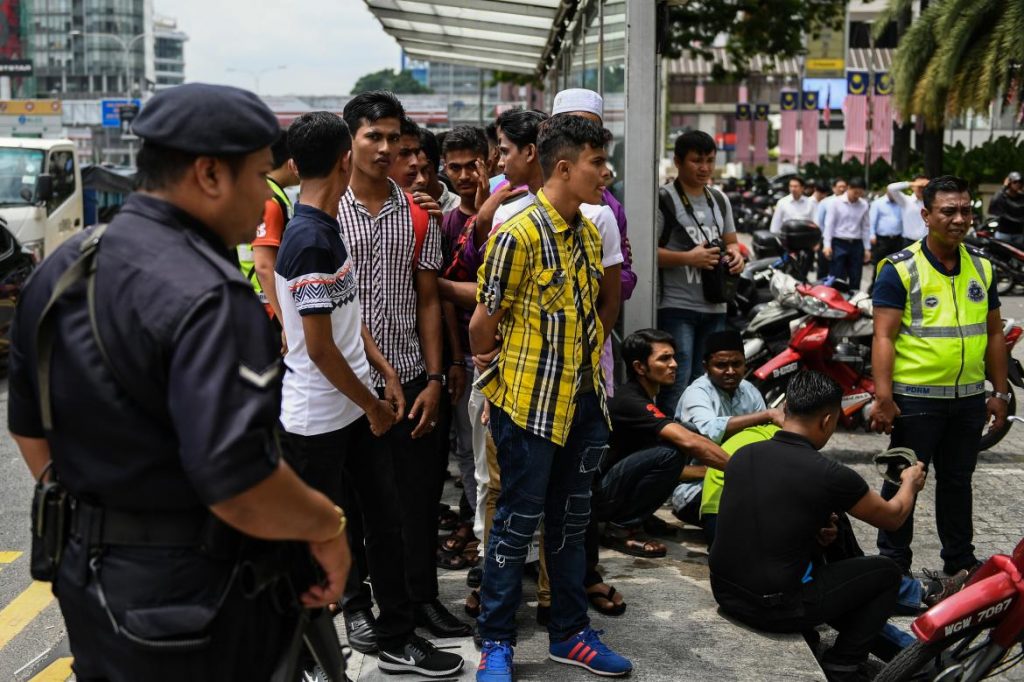By OLIVER SLOW | FRONTIER
KUALA LUMPUR — A senior Malaysian official has defended his government’s decision to allow thousands of Rohingya to hold a protest in Kuala Lumpur, saying it should not be regarded as a “criticism” of the Myanmar government.
Thousands of Rohingya took to the streets of Kuala Lumpur on August 30, calling for an end to the violence in northern Rakhine State, which has seen at least 400 people killed and tens of thousands displaced.
According to Malaysian media reports, 44 people were detained for “causing trouble” at the protest.
Speaking at a press conference about the state of democracy in Southeast Asia, held in Kuala Lumpur on September 2-3, Datuk Paul Low Seng Kan, a minister in the Malaysian Prime Minister’s Department, said that the protests should be regarded as the Malaysian government allowing “freedom of expression of minorities”.
Support more independent journalism like this. Sign up to be a Frontier member.
“These are done independently, coming from themselves. I believe that Malaysia can allow freedom of expression in that sense, for people who need a space to express themselves,” he said.
While Malaysia’s constitution guarantees the right to freedom of assembly, the ruling Barisan Nasional coalition, which has governed Malaysia since independence, has regularly taken a forceful approach to curtailing opposition and anti-corruption protests.
A Rohingya community leader in Kuala Lumpur, Mohd Rafi, was quoted in Malaysian media as saying that many of those who had attended the protest had lost family members in the latest violence.
“Please understand, my people were not picking fights with the police or Malaysians, they’re just grieving right now and can’t control themselves,” he told Malay Online.
The latest wave of violence to affect Rakhine State came after the Arakan Rohingya Solidarity Army attacked police outposts in the north of the state in the early hours of August 25, killing at least 12 officials.
Myanmar authorities have launched a new “clearance operations” campaign, killing at least 400 people — the majority, it claims, are fighters from ARSA — and displacing more than 100,000 people, including nearly 90,000 people who fled across the border to Bangladesh. Activist groups say the number of people killed could be in the thousands.
Malaysia is officially home to 60,000 Rohingya refugees registered with the United Nations High Commissioner for Refugees, but the real figure could be as high as 100,000 migrant groups claim.
‘A success story’
The conference, which was named ‘Democracy in Southeast Asia: Achievements, challenges and prospects’ and hosted by the Kofi Annan Foundation and SUHAKAM, Malaysia’s human rights commission, was officially opened by former Indonesia president Dr Haji Sudilo Bambang Yudhoyono, who said his country’s transition from military rule to dictatorship had succeeded because of a reform of the military institution, as well as a strong civil society.
Indonesia began its reform process in 1998, after the fall of former authoritarian president Suharto.
Indonesia’s transition to democracy was highlighted by other speakers at the event. On August 3, Mr Tan Sri Rastam Mohd Isa, from Malaysia’s Institute of Strategic and International Studies, said the country, the largest in Southeast Asia, had made significant progress in its electoral process in the past 20 years.
“Indonesia has progressed wonderfully,” he told the audience. “It is a very large country, but it has carried out elections in a relatively successful manner.”
The event was held at a time of concern about the state of democracy in some Southeast Asian countries. In Cambodia, prime minister Hun Sen has arrested opposition leader Kem Sokha and closed independent paper The Cambodia Daily over the weekend of the conference, while much attention will be placed on Malaysia, which is due to hold an election within the next year.
The Myanmar story
While Myanmar’s 2015 general election was hailed as a success story, there were a limited number of attendees from the country at the event.
On August 3, Dr Kyaw Yin Hlaing, founder of the Center for Diversity and National Harmony in Yangon, chaired a panel named “Key role of CSOs in ensuring respect for political rights including elections”.
He highlighted the important role civil societies can play in ensuring political rights for individuals, adding that in Myanmar, despite the country no longer being under direct military rule, many citizens were still not aware of their political rights.
“There is a saying that goes, no civil society, no democracy; but I think it should be no vibrant civil society, no stable democracy,” he said.







